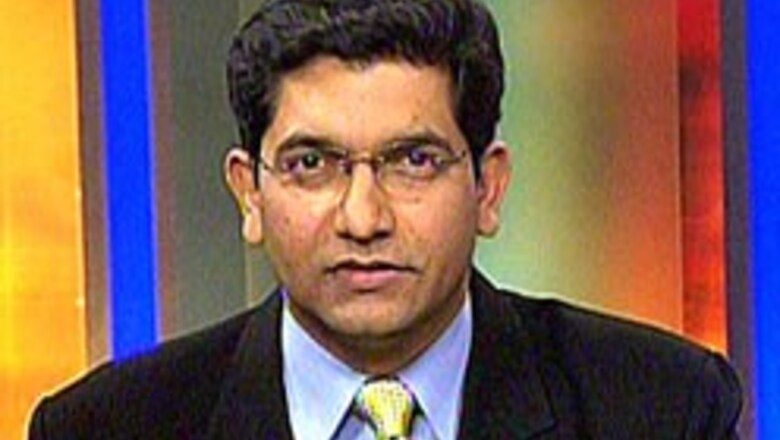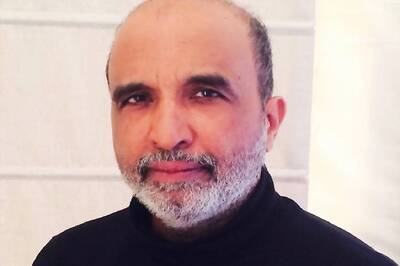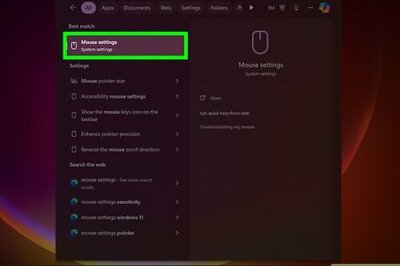
views
The nuclear deal has inflamed political passions, Left, Right and Centre. Although much has been debated about the deal, what exactly are its various elements?
What is good and what is not so good about the Hyde Act, the 123 Agreement and the Safeguards Agreement?
What happens, if for various reasons, the deal does not go through during the Bush Presidency? What happens, indeed, if the deal does go through? Is there any danger of India's strategic autonomy being compromised?
In order to throw light on the above, IBNLive.com organsied a chat with Dr. Vidya Shankar Aiyar, IBN World Executive Editor. Reproduced below is the full text of the chat.
Achintya Dhang: Do you support the decision of the Left? How much it will cost in the coming general elections?
Dr Vidya Shankar Aiyar: I can understand why the Left did it. I don't have an opinion on whether it is right or wrong. It is what the Left has chosen to do and we have to live with the consequences of that. But I do have an opinion on what the PMO did. I think releasing details of the safeguards agreement on July 2 for the first time to the world at large, only to hastily answer Amar Singh on the day the NSA met him, even before India initialled the safeguard agreement at the IAEA (which was only July 7 according to the government) is, to say the very least, 'ridiculous' and completely exposes the government.
Sourabh Pradhan: Reading your responses, it seems that you find the PM to be responsible for the whole mess. You say that there should not be any rush to get this deal through as it can be done in the tenure of the next administration. But isn't it likely that with new governments in place, both in India (possibly) and US (certainly), the deal will lose the impetus. Both sides may try to renegotiate. Don't you think so?
Dr Vidya Shankar Aiyar: You are correct. I do believe the PM is responsible for this unnecessary mess. But I also believe he has been wrongly advised. He is a good man. I have no doubt regarding that. And if the two sides want to 'renegotiate', so what? When we have waited for more than 3 decades, why not wait a couple of years more if necessary? At least you would have de jure bipartisan support to this deal. That is the best insurance this country can have that the US will not go back on its word, time and different administration backing the deal!
Parthiban: After the implementation of Indo-US nuclear deal, can India do the nuclear test without permission from IAEA or NSG?
Dr Vidya Shankar Aiyar: In any case India needs no one’s permission.
Sreenivas: What is bad about the deal? Can you specify the technicality?
Dr Vidya Shankar Aiyar: India is given de facto recognition as a nuclear weapon state, not a de jure one. All international law will follow from a de jure one. All contradictions in the 123 and the IAEA agreements flow from this vital difference. The deal as it stands now, tries to square a circle. So it is risky to that extent.
Punyashlok Dwibedy: Do you think that if the NDA comes to power in 2009, they will be accepting this deal on the whole considering this would be a major foreign policy success of the UPA?
Dr Vidya Shankar Aiyar: They will but they might try and amend our own domestic atomic energy act.
Vikram: The scientists in the US are very much worried about this India-specific nuclear deal. According to environmentalists, the nuclear waste keeps transmitting radiation for 1000 years. Don’t you think this is going to pollute the already-polluted Indian environment?
Dr Vidya Shankar Aiyar: We have to certainly lie in the bed we make.
Manoj Krishna: Even though the text of the draft to IAEA looks fine, will the 123 Agreement and the Hyde Act hurt India's foreign policy and strategic independence? Is it a cause of concern?
Dr Vidya Shankar Aiyar: This is a billion-dollar question.. The present government with its method of cloak-and-dagger negotiations and dealings with the Left and its own party does not leave one with the confidence that there is nothing to fear. It is certain though if a US administration wants to hurt us, it will no matter.
Srikanth: NPT proponents in the USA say that the deal is against USA's interest, while opponents of the nuke deal (both BJP and Left) believe that the deal is against India! Do you really feel that there is a conflict of reason here? While the BJP is opposing the deal just for the heck of it, the Left is opposing because we are dealing with the US. What does the deal mean for different political parties, politically?
Dr Vidya Shankar Aiyar: You are obviously sold on all the media hype!:) Please read the agreements and come to your own conclusions. Should there not be more information in the public space on this for the people to decide?
PAGE_BREAK
Mishti: Is there a clear mandate that "this deal is good for India"? If the NDA comes into power can they modify or take this deal ahead?
Dr Vidya Shankar Aiyar:A deal, as opposed to THIS deal is definitely good for India. Whether THIS deal is good for India or not needs robust debate. And there is nothing wrong with the government sharing that or eliciting the views of the people on this. The government, after all, does this in many many instances. The best example I can cite is the time of the WTO talks before it came into existence. There was a lot of public debate on whether India must adopt product patent or process patent, understanding the role of TRIPS and TRIMS etc. It's a pity the PMO has taken the attitude that it knows best and has complete disdain for any public interaction on this nuclear subject. The government has also completely followed the US lead in the negotiations…after all, the offer came from there.
Manoj: How will this deal ensure (a) supply of power at current rates (b) Penalty for foreign corporations if electricity generation is stopped citing any reason, including political?
Dr Vidya Shankar Aiyar: It is going to cost us, get ready for that!
Sudhir: After seeing the draft agreement, don't you think the BJP should have supported the nuclear deal? This would have shown the world that when it comes to nations interest, we are all one...
Dr Vidya Shankar Aiyar: Then the government should have accepted the idea of reaching out to them formally. The problem is all our political parties wanted exclusive credit for this deal and each claims exclusive rights to national interest as well.:)
Subhasis Mishra: What will be the road ahead for the Communists? If the Government clears the floor test then it will be hard on the Communists’ part to concede defeat and get back to the masses.
Dr Vidya Shankar Aiyar: Ask the Communists..:)
Vasu: What are the generic reasons that we need the N-deal? First of all, one should think of inflation and then about the deal. What do you say about this?
Dr Vidya Shankar Aiyar: I agree. There is no need to panic on the deal. I do believe the way things stand with the US, a deal is likely anyway in the near term.
Achintya Dhang: Hi Vidya! The Left has withdrawn their support for they have been provided improper and inadequate information. Do you think the draft which has been released on the website is the perfect one?
Dr Vidya Shankar Aiyar: Oh yes you can check it with the MEA website.
Rishab Jain: Vidya, hasn’t the Congress’ top officials put the external affairs minister Pranab Mukherjee in an embarrassing position after all the talks of approaching the IAEA after confidence vote and also the confidential document thing?
Dr Vidya Shankar Aiyar: This one the PMO is responsible for.
Kanwal: There is talk about energy security for India based on the deal and the Left has always been rubbishing the claims by saying nuclear power may only be 6% or less than 10% of the total energy needs in 15 years. If this is so why the hype about the deal and why has Congress taken the risk of the Govt?
Dr Vidya Shankar Aiyar: There is hype no doubt.. And the Congress finds itself in a pretty pickle. While the idea of the deal is good, namely, removing India's nuclear isolation, the rush right now is hardly sensible considering the times we are living in – inflation, oil prices etc.
Ajith: Was the nuclear deal just a means to snap ties with the Left. The Left Front was getting all the credit for the good decisions and all the bad decisions were being projected as Congress’ mistakes. Even today if elections were to happen, the Left cannot get more seats as compared to the last time and the only party which can reap the benefits of drop in Left seat is Congress (especially in Kerala). Do you think the nuke deal was just a means to pull the plug from the Left?
Dr Vidya Shankar Aiyar: No. The nuke deal is not an excuse. I think there was a disconnect between the PMO and the party at one point. And now it seems there was a disconnect between the PMO and the MEA! So, it is clear: the PMO is driving this whole process.
PAGE_BREAK
Narayan: Why doesn’t the media talk about the opposition of scientists like P K Iyengar and A Gopalakrishnan to the N-deal and the hegemonic Hyde Act? Please tell the people also the negative side of the deal.
Dr Vidya Shankar Aiyar: We did do a story yesterday with them as well.
Shivaraman: Vidya, there is a lot of discussion on the nuke subject in the media. But a layman may not understand the good or bad of the deal in simple language. Don’t you think the citizen should know something in simple words about the whole matter?
Dr Vidya Shankar Aiyar: It's the media's responsibility to simplify a complicated matter and present it to the layman. We have failed in this. Ignorance is bliss. The media in general neither has the patience nor the expertise to actually do the job. It's at a time like this you would want a public broadcaster to step in. It's a pity. I think the citizen is more interested right now about high prices...
Mishti: Is Pakistan also trying to get such a deal? Will it affect us? Is the US ready for such a deal with Pakistan?
Dr Vidya Shankar Aiyar: The US is not ready to do this with Pakistan.
Maya Sundararajan: Is it true that we are surrendering our autonomy to test nuclear weapons by signing the deal? If not so, then why is there an opposition by the Left Front?
Dr Vidya Shankar Aiyar: Testing is our sovereign right. It's just that in international relations it will have consequences and we need to accept that.
Philip Joshua: We need energy security for the future. That's good. Pls throw some light about what is bad in the deal.
Dr Vidya Shankar Aiyar: A deal is good. But is this deal good? We need to examine this in a larger debate. Here's a rough progress report
Hyde Act: Troubling conditions, but has changed US law already to allow nuclear trade with India.
123 Agreement: The good thing is that it doesn't give anything away from the Indian side, but then it's a tortuous text that can be interpreted by either side in any way. The most troubling part has been the meaning of 'corrective measures' that the two sides fought over but decided to leave unchanged from the July18, 2005 text. Copy pasted from there!
IAEA agreement: It leaves India in the driving seat, but the same problem persists –the mention of 'corrective measures’ without definition. The idea of an 'umbrella agreement' is unprecedented in IAEA history. Will it have legal validity at a time of crisis? Who knows? Interestingly, the reference in the agreement is made to the July 18 2005 joint statement, as a source of comfort to have 'corrective measures' thrown in! Will the rest of the board allow it to pass? We will have to wait and see.
Oliver: Vidya, we may have concerns over the safeguard agreement. But looking at the larger picture, do you think that eventually irrespective of who is in power, it'd have been impossible for the govt to not to enter into such an agreement? Did we have a better choice? And lastly, can US now afford to arm-twist India based on this agreement?
Dr Vidya Shankar Aiyar: I agree that an Indo-US nuclear deal would now be inevitable, and yes, we did have a better choice, a bolder choice. We could have actually aimed for getting it through in the next administration. Why are we so scared of losing it if we don't make it in the Bush presidency? Despite claiming that the bill has bipartisan support, we seem to be acting like it is between only 2 administrations? And what gives the government the confidence that things won't change with a new administration, even if we DO make it in the Bush presidency?
PAGE_BREAK
Rishi: What will happen if the deal fails to pass? India’s image will be ruined in the world. Why don’t the Left and the BJP understand this simple thing? I think the Left parties are more concerned for China than India. What is your opinion?
Dr Vidya Shankar Aiyar: I totally disagree. This deal will go through either now or sometime in the future and most probably in the next administration. There is no reason to rush as we are doing now, except to make it in Bush's presidency. India's image will remain intact. It's pure scare-mongering by the government to say that if we do not sign now then all is lost, no uranium will come to India, our reactors will choke etc. A bit like the Republicans scaremongering to get the people in the US to vote Republican in the elections or else get ready for another 9/11!
Gopal: Is it possible for India to conduct atom bomb test without the permission of the United States? Why is the Congress not willing to give the entire details of the agreement?
Dr Vidya Shankar Aiyar: It is always possible for India to test. If we do though, we must be ready to face the consequences regardless of this deal, and that means sanctions etc. Why was the Congress not willing? Well, I think the decision was more of the PMO than the party as such.
Mohit: Does India have to sign the CTBT? And what becomes of the NPT?
Dr Vidya Shankar Aiyar: If this deal goes through, the pressure will be high to do both at some point. If this deal does not go through the pressure will still be high, except we may have a little more elbow room, in that we will not be violating any existing agreement that we have put our signatures to. So, damned if we do, damned if we don't. But we still have to grow up in this world and stand for what we believe.
Rajiv Mahajan: Communists are consistent in their approach not to let India prosper and hence their opposition to nuke deal is understandable. The BJP is playing petty politics in an issue which required them to rise above such pettiness, and, hence their role is reprehensible. I am impressed with Sonia Gandhi the way she has stood up for this deal purely in national interest & when she could have chosen the easier way out especially to save her govt. This is the lady whom so many people thought is a foreigner & heaped all sort of abuses. Do you agree?
Dr Vidya Shankar Aiyar: No I don't. Think you are too black and white in your picture. My understanding is more shades of grey. I definitely don't believe that the Left doesn't want to let India prosper. I do agree Sonia Gandhi is conducting herself fairly well in this sordid drama. The PM certainly isn't. We can agree to disagree. :)
K R K Varier: The Good - Nuclear Deal The Bad - Left The Ugly - Congress The boat missers – BJP. The trivials - Other parties Eternal believers - Indian People Is this correct?
PAGE_BREAK
Dr Vidya Shankar Aiyar: :) Not really. It's more like the "Murder on the Orient Express"-- all on the train are guilty.
Ramakrishnan: Dr. Vidya Shankar, Mr.Karunanidhi told in the beginning that he had apprehensions about the deal like the Left; after that he changed the stance to "I share the apprehensions of the Left and at the same I share the concern of the Govt too" and now his party is going to vote in favour of the deal. Could you tell me how the fears of Left remain intact and how the same fears got vanished in the case of Karunanidhi?
Dr Vidya Shankar Aiyar: Don't see a contradiction here. Think he's only saying he appreciates both points of view.
Praveen Anaswara: I feel that the hazard in the 123 deal is nothing but the strategic shift that the UPA govt has made. This is an active violation of the old non-proliferation treaty. The essence of the deal should be made available to the mass of the country, if Manmohan Singh wants a return to Parliament. As an economist, he should be well aware about "prioritisation" and here this points towards the commodity price rise and the oil mayhem. I suggest that alternative energy solutions like hydro and pipeline projects should be rejuvenated.
Dr Vidya Shankar Aiyar: Sure, though I am not sure who you claim is violating the NPT. India is not a signatory.
Subhasis Mishra: How do you see the future of Indo-Russian relationship keeping this nuke deal as the backdrop?
Dr Vidya Shankar Aiyar: It should do just fine. The deal will enable us to do more business with Russia, for sure.
Kanwal: Do you think the Govt has been hiding anything from the nation? Why was the draft not shown to the Left even after having sent to the IAEA Board for circulation?
Dr Vidya Shankar Aiyar: I don't think the government has been 'hiding' with any malafide intentions, but the entire exercise has been very badly managed by the PM's men. The PM must take responsibility for it, no doubt. It is clear though that the PM decided not to share the draft with the Left. He could have said as much, instead of going through what appears to be an elaborate charade. I do believe the PM was advised wrongly by his office. If the deal is good, and the safeguards agreement is good, then forget the Left, why not share that with the country? The reason for the PMO's circumspection though comes at 2 levels. One, the government may be worried that if it decides to elaborate on its contentious issues, such as the right to 'corrective measure' it might raise concerns around the world on proliferation. Two, the PMO just didn't think it was important enough to build confidence in this deal publicly at any stage. A pity.




















Comments
0 comment